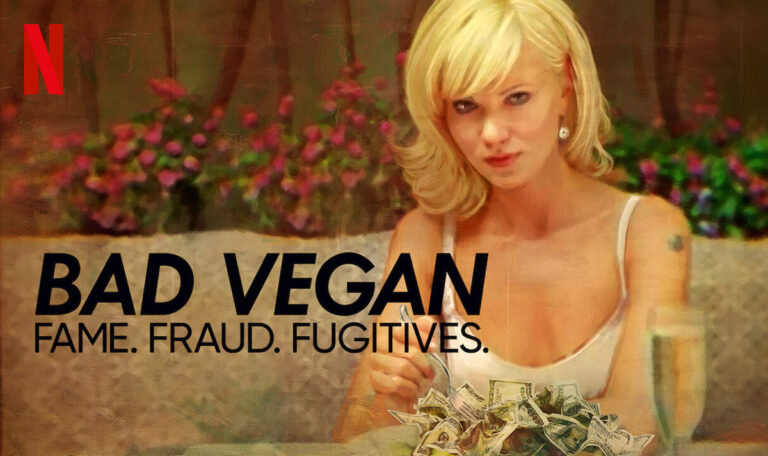‘Bad Vegan’ is the latest show feeding our growing obsession with con artists and scammers

Despite hiking the prices up in the UK and Ireland for its streaming services this year and cracking down on sharing subscriptions among households, Netflix continues to keep us in its grasp. The leading platform in streaming pulls us back in for exciting new shows (both external and original) hosted on its site—be it with the world-stopping Top Boy’s fourth season or its true crime docuseries domination, we just can’t get enough. More recently, however, the platform has been witnessing the rise of an epidemic: scammer shows. Last week, Netflix’s latest foray into the world of crime kicked off with the drop of a documentary called Bad Vegan: Fame. Fraud. Fugitives which delves into the bizarre world of—you guessed it—food and fraud.
Yes, Netflix has seemingly struck gold with the advent of the scam and sham shows, but “all that glitters” comes to mind with this latest trend.
View this post on Instagram
Before you plan to binge, Bad Vegan, for those of you that don’t know already, is a docuseries following former vegan queen Sarma Melngailis, an uber-successful restaurateur who lost it all to a scammer that swindled her out of millions—$2 milion (about £1.4 million) to be exact—in wire transfers alone. Her collapsing restaurant led to her scamming both investors as well as her own employees out of their paychecks in a bid to save herself from a total debt of over $6 million (£4.5 million), the docuseries detailed. Of course, it debuted with a 100 per cent perfect score on Rotten Tomatoes—what’s not to love about a juicy downfall, huh?
The four-part series following Melngailis’ fall from grace after meeting and marrying Anthony Strangis (who was actually married already) has had everyone hooked on it since its release on 16 March 2022. This comes across as no surprise, given how the show has all the good hallmarks of a hit-documentary in making: money, meat suits and a maddening story of a successful woman being taken advantage of by a leach scammer—who was introduced to her by none other than Alec Baldwin, of all people.
View this post on Instagram
But Melngailis’ restaurant Pure Food and Wine was anything other than pure, as the documentary discovers. Evading spoilers—though everything I could say would make no sense to you, I mean, meat suits and dog immortality are involved—Bad Vegan dives deep into the ridiculous realm of vegan influencers. Attempting to make sense of Melngailis’ Instagram bio which reads: “Rikers alum. It’s a long story.”
But between this, The Tinder Swindler and Inventing Anna, Netflix’s niche in the scam show department has made us unable to tear our eyes away from any car crash they decide to televise. However, the show’s creator, Chris Smith, stands by his Bad Vegan baby. “Look, everything is shades of grey,” he said to The Guardian. “We tried to represent it as accurately as we could from the information we had through the documentation that was presented to us and through the interview,” the director continued.
Once Netflix found its goldmine of borderline-bonanza shows with Tiger King, it was hard for the platform to stray away from its tried-and-true formula of shows that shock and entice viewers to keep watching. Cosmopolitan noted that the masterminds behind Bad Vegan are actually responsible for other insanely viral shows like Tiger King and Fyre: The Greatest Party That Never Happened—which both score high on the batshit crazy-o-metre for your bingeing delight.
Last week, Radio Times questioned the machine speed at which Netflix pumps out these true crime shows, with Bad Vegan exposing the platform’s “bad habit.” The outlet commented that “turning a single Vanity Fair piece into four hours of television feels excessive” and the problem with the so-called “limited” shows is that they aren’t limited enough. They’re simply too long. Too much of a good thing—though I wouldn’t call the Joe Exotic two-season extravaganza and spin-off, The Doc Antle Story, good—does have its eventual downside.
But what if the problem is much bigger than that? Over-investment in celebrity lives has an impact on your brain and studies have proven that it could actually make you less intelligent. So what about true crime and the obsessions with a brutal backslide? Though meme-rich and endless avenues for spin-offs probably make the company wide-eyed and eager to cash in, the harm also becomes a greater threat. They additionally come at the expense of the very people starring in them and while I won’t defend Melngailis, a show about her should at least be a portrayal she somewhat agrees with. Though there’s a lot the show “gets right,” as Melngailis acknowledged in a blog posted after the show’s release, she wasn’t so keen on others, the ending is one example.
So, seeing as Netflix isn’t giving up on this trend of true crime habit and giving us our fix of drama, despite the predicament some outlets have pointed out, we will have to wait and see what else is in store for the streaming platform. Who knows, maybe we’ll finally get a ten-parter on John McAfee—you know, the computer software mogul-turned-medicine-kingpin with a payroll of gangsters, fugitive and possible murderer? There’s a lot of people Netflix should investigate.
Anyway, at least Leon (Melngailis’ dog) is alive and well, unscathed by the events of the scams, maybe he might be immortal after all.




